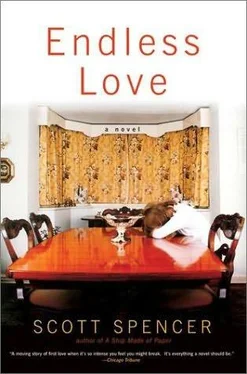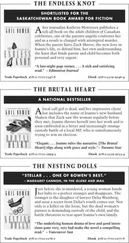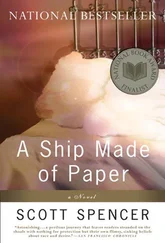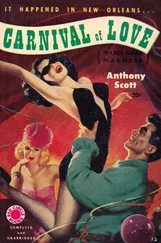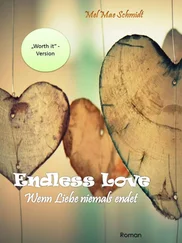I was walking up Fifth Avenue to pass an hour or two before it was time to call Ann. Hugh was with his new lover remembering the things he’d been taught to want when he was young. Who knows how many people were out there with us? A million seems a fair guess. New York is the place in America where you’re most likely to meet someone you know; it’s our capital of surprise encounters. If you stay there long enough you might see everyone you ever knew.
I’m thinking of a skeleton bent expectantly over a radar screen and Hugh and I are blips of light heading into each other’s path with the blind imperiousness of comets.
We are blind to the future. We can barely hold on to our strange versions of the past. We see only a little of what is directly before us. We know almost nothing. The only way we can stand it is not to care. I care and I can’t stand it.
I should just breathe in and out and be brave. But not knowing what is going to happen next and living with the hope that whatever it is it won’t be too difficult to understand is like driving at top speed with the windshield completely painted over with a picture of where you used to live.
I had been looking in the window of the Doubleday Bookstore. I was thinking of going in to buy Ann a book. It had once been a common thing for me to bring her things to read, trading her a copy of Jews Without Money for The Good Soldier or The Subterraneans for Strait Is the Gate. We were so entertained by our differences. And I was thinking that a part of that pleasure might be recaptured if I brought her a book. But nothing on display in the window seemed right for Ann and I couldn’t think of anything I’d read recently that I wanted to give her. I turned around and I saw that across the street and a little to the north was Tiffany’s. Jade and I once saw the movie Breakfast at Tiffany’s. We’d skipped school and watched it at the Clark Theater in downtown Chicago, and when Audrey Hepburn went searching for her cat in the rain Jade and I sat sobbing in that empty theater, squandering our emotions with the abandon of drunken pirates reeling through port with a sack full of gold.
I thought that I would go and take a close look at Tiffany’s. If I saw Jade soon, it would be something I could tell her about. I walked to the corner and waited with about fifty other people for the light to change. I was folded into the crowd and feeling poorly dressed. In Chicago, a city of blondes, I always felt dashingly Semitic, but here in New York, surrounded by men in dark suits and inkwell eyes, by women with huge spreading mantles of electrified black hair, in that mass of silk ties and jewelry, I was overwhelmed by the classiness of Manhattan and had the hick’s reflexive comeback: Are these people for real? It was in the middle of the day and I could have been standing in the lobby of the Opera House. As subtly as I could, I glanced from face to serious face, at the large noses that were displayed like genetic trophies, at the furry eyebrows and four o’clock shadows, at a powder blue beret, a shaved head, a teenager with a red velvet yarmulke.
And then I happened to let my glance drift to the other side of the street where a knot of pedestrians just like the one I stood in was waiting for the light to change. And there was Hugh, standing at the edge of the curb and staring directly at me. Next to him was a tall woman with reddish braids wearing a sleeveless shirt and a denim skirt. She was holding a shopping bag and looking straight up into the sky. I followed her gaze and saw a small plane expelling gauzy smoke and sky-writing a message: and H, an O, a V…
There were so many responses available to me.
The light governing north-south traffic was still green. I cut through the crowd and crossed 57th Street, heading toward the fragrant green blur of Central Park. Though I knew, essentially, it wasn’t so, I told myself that Hugh hadn’t seen me and that I’d be doing us both a favor if I got out of his way. I moved with my head down and I moved quickly. I was almost running.
Hugh bolted after me, cutting diagonally across Fifth Avenue and 57th Street, coming at me like an arrow. Ingrid shouted out to him, as she would tell us later: “Hugh! What are you doing?”
And here comes the taxi cab, gunning ahead to make it through the yellow light, because cab drivers are always in an acute hurry. That’s how they make a living.
I glanced back once to see if Hugh was following me. He was, of course, and I tried to make myself stop but I couldn’t. My legs were committed to cowardice. I told myself not to look back again, just to keep going straight and fast. The sidewalk was crowded; it was like a Christmas crowd.
Everything was noisy and dense but the sound of those brakes couldn’t have been more penetrating if I’d heard them in a concert hall. I stopped in my tracks and turned around and saw Hugh just the moment after the taxi struck him.
He was in the air, sailing backwards in a northwesterly direction. It looked like a stunt. The taxi cab was going up an inch, back an inch, starting and stopping and bobbing up and down as if in seizure. No one was saying anything and Hugh was in the air.
Then he was on his back, but still moving, shooting along as if he were on a sled. His arms were spread at his side and his tan jacket was riding up and bunching at the shoulders. He was turning over, in a broken, graceless motion—now, for the first moment, it looked serious and out of control. He turned on his right shoulder but his head didn’t move and his legs were going in two different directions. It looked like he might break into pieces. And now another car was slamming on its brakes and another and another. For the first moments after the cab hit Hugh, his body had been skidding in its own lane, between the east-west traffic on 57th Street, but now that was no longer the case.
It probably didn’t matter. The taxi that hit him was going fast and it hit him direct. Hugh was probably already dead, or on his way toward death. But a green florist’s van hit him a second time. It wasn’t even a hit. The little truck rolled over Hugh and ruined the top part of his lifeless body.
Did the sky turn red? Did the sun even hesitate in its stiff rounds? The world, even along the dense strip of Manhattan, seemed utterly calm. People turned slowly, quietly; faces wore that perplexed, slightly absent expression you see in the lobby after an avant garde play. This is it? You tell me what it means. It was as if we needed a second look to confirm what had happened. And then the image of that man being tossed like a sack of meal by that cab completed its frantic loop through our senses and we did see it again. The long moments of waiting were over, the synaptic reprieve canceled, and now the first screams, the first shouts, the first hands clapped over unwilling eyes—we were suddenly a terror-struck herd staggering toward the street, stepping on each other’s heels, elbowing each other, afraid to look too carefully at any stranger, and each of us hoping that someone would know what to do.
But no one knew what to do. No one ever does. We were just moving toward the point of impact. Then I saw Hugh get up, but that didn’t happen. Someone in front of me dropped a pretzel, one of those big brain-sized New York pretzels, and I stepped on it accidentally. Someone else dropped a newspaper. People were dropping things.
“Oh Jesus,” I heard someone say, “don’t look. Please, sweetheart. Don’t look.”
I was half on the curb, half in the street. All traffic was stopped. Five blocks down, cars were blowing their horns. There were dozens and dozens of people in front of me. No one was screaming “I’m a doctor!” No one was asking us to make a path. It was all right just to be standing around like a total idiot.
Читать дальше
